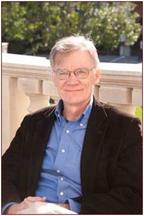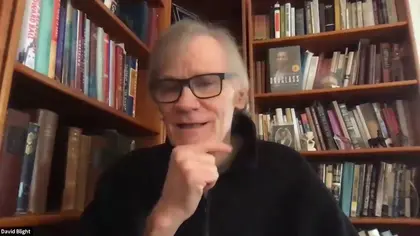Frederick Douglass Offers Wisdom for the Present, Says Prof. David W. Blight
Convening Yale
Monday, Nov 9 2020 at 11:45 am - 12:45 pm EST
 Please join us on November 9 for a Convening Yale lecture with David Blight, Sterling Professor of History, of African American studies, and of American studies. This conversation is hosted by the dean’s office and will be moderated by Shyam Sunder, James L. Frank Professor of Accounting, Economics, and Finance at Yale SOM.
Please join us on November 9 for a Convening Yale lecture with David Blight, Sterling Professor of History, of African American studies, and of American studies. This conversation is hosted by the dean’s office and will be moderated by Shyam Sunder, James L. Frank Professor of Accounting, Economics, and Finance at Yale SOM.
David W. Blight is Sterling Professor of History and director of the Gilder Lehrman Center for the Study of Slavery, Resistance, and Abolition at Yale University. He previously taught at North Central College in Illinois, at Harvard University, and at Amherst College. In October of 2018, Simon and Schuster published his new biography of Frederick Douglass, Frederick Douglass: Prophet of Freedom, which has won more than seven book awards, including the Pulitzer Prize for History, the Gilder Lehrman Lincoln Prize, the Bancroft Prize for History, and the Francis Parkman Prize.
Convening Yale presents talks by faculty and leaders from throughout Yale University, who share their research and expertise and help students broaden their understanding of an increasingly complex world. The Convening Yale series is made possible through the generous support of the Robert J. Silver ’50 Fund for Innovation in Management Education.
Thanks to a tireless national speaking schedule, Frederick Douglass’ was the most recognizable voice among Americans of his century, and Douglass’ words continue to resonate in the national political and social climate today, said David W. Blight, Sterling Professor of History and professor of African American studies and American studies, during a virtual lecture hosted by the Yale School of Management on November 9.
Blight is the author of the 2019 Pulitzer Prize-winning biography Frederick Douglass: Prophet of Freedom. He spoke to Yale SOM students as part of the Convening Yale series, which brings faculty and leaders from throughout Yale University to SOM to share their research and expertise and help students broaden their understanding of an increasingly complex world.
Douglass’ writings are useful to revisit in the present moment for several reasons, Blight said. Most notably, he said, Douglass was particularly vocal about democracy—a concept that Americans are discussing and debating now more than ever.
“He never stopped thinking about, never stopped talking about, the deepest nature of democracy,” said Blight.
Douglass also wrestled with the conflict between the promises of American democracy and the realities of the American experience, especially as it expressed itself in his lived experience as a Black person—and a former slave—in America.
Douglass approached this “American contradiction” with “terrible honesty,” said Blight. “He both loved and hated his country. He developed into a kind of radical patriot who had a fierce honesty about what it meant to love one’s country, to believe in its ideals apart from its practices.”
Blight said that individuals can also find among Douglass’ works insight into race in America, his struggles with fame, and his reflections on protest and achieving freedom.

